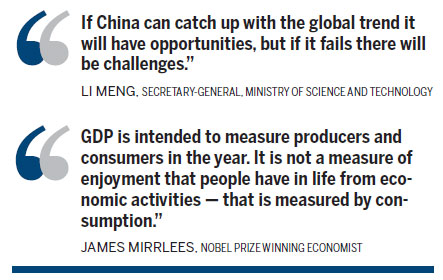

Experts, entrepreneurs discuss the 'new revolution' underway
Government officials, leading scholars and entrepreneurs called for innovative ways to retool the economy and industrialize new technologies during the Zhongguancun Forum that opened on Sept 12 in Beijing.
Li Meng, secretary-general of the Ministry of Science and Technology, told the conference that the world is facing a new revolution in science and technology - and that innovation is "an inexhaustible motivating force".
"If China can catch up with the global trend it will have opportunities, but if it fails there will be challenges," he said.
Although GDP has been widely used to measure an economy, Nobel Prize winning economist James Mirrlees suggested there could be a better way.
"GDP is intended to measure producers and consumers in the year," he explained. "It is not a measure of enjoyment that people have in life from economic activities - that is measured by consumption."

He introduced the concept of "green GDP" that includes not only goods and services but also changes in resources and the environment.
Some scholars also want to factor in human capital, knowledge and health.
Mirrlees noted that faster growth "is not necessarily better".
"A country could be happier than another not because of GDP, but because it doesn't spend as much time working on unpleasant jobs," he said.
In a keynote speech, Ken Wilcox, president of Silicon Valley Bank, said that Beijing "will in general play a big role in realizing the 'China Dream'", adding he is optimistic about the future space for innovation in the country.
"First, the Chinese government has put strong support behind innovation," he said. "Second, clearly there is more than adequate brainpower in China - China graduates more PhDs in hard sciences than any other country.
"The entrepreneurship in China is very strong," he continued, adding that capital markets are improving.
But he also noted bottlenecks. He said the capital model is either too expensive or too risky while the capital allocation process is not yet mature, intellectual property protection is not assured and market transparency is "often lacking".
A speech by Professor Jari Kinaret from Chalmers University of Technology in Sweden highlighted the use of corporate participation and international collaboration to transform the results of innovation from laboratories into products on the market.
Kinaret is the leading researcher in the graphene, a crystalline form of carbon, in a program by the European Union funded with 1 billion euros ($1.3 billion).
He used his own research as an example, saying that the initial research was mostly done at universities, but "over time, more and more will be taken over by companies".
He said the initiative is focused on an "intellectual value chain that covers the entire spectrum" in academic, applied and industrial research. And there is another value chain - in industry, rising from materials to components and products.
Innovation does not necessarily damage traditional technologies, said Wang Minghua, professor at Beihang University, an expert on 3D printing technology.
"The manufacturing industry is a family," he said. "The 3D printing is just a member of the family and is complementary to traditional manufacturing."
zhangzhao@chinadaily.com.cn
|
Held annually, this year's forum has the theme of "scientific innovation and industrial revolution". Photos by Wang Jing / China Daily |
|
Nobel Prize winning economist James Mirrlees at the opening ceremony. |
|
Delegates listen to latest trends and ideas. |